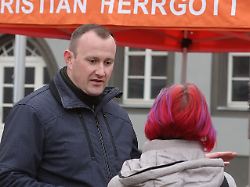Runoff election in the Saale-Orla district
Can the protest mood prevent AfD district administrator?
January 25, 2024, 3:14 p.m
The AfD is not only doing very well in nationwide surveys, but has recently achieved some success locally. But in view of the protests by hundreds of thousands against the party and for democracy, will it continue to ride the wave of success? An upcoming runoff election in Thuringia can provide answers.
Amid a nationwide wave of protests against right-wing extremism, the AfD is hoping for its second district administrator position in the Saale-Orla district in eastern Thuringia. On Sunday, AfD candidate Uwe Thrum and CDU man Christian Herrgott will face each other in a runoff election in the rural district.
In the first round of voting two weeks ago, Thrum received 45.7 percent of the vote, well ahead of Herrgott, who achieved 33.3 percent. This gives the AfD the chance to appoint the second district administrator in Germany after Robert Sesselmann in Sonneberg.
It is difficult to estimate how the current protests will affect the election, says Erfurt political scientist André Brodocz. “It is conceivable that it will increase voter turnout, which tends to be low in local elections.” Anyone who rejects the AfD, does not feel connected to any other party and often stays at home during such elections could be motivated to vote for democratic candidates. Voter turnout in the first round was 66 percent.
Expert: Protest voters could stay at home
Even those who have previously voted for the AfD in protest against politics in the state and federal government could see through the demonstrations that the protest vote also means a vote for right-wing extremist politics, says Brodocz. “You could therefore forego voting in the runoff election and, in the future, turn to new party offers such as Sarah Wagenknecht’s alliance.”
According to police reports, over 900,000 people took to the streets nationwide last weekend. The trigger was revelations about a meeting of right-wing extremists, in which some AfD politicians also took part. In Thuringia, the AfD is classified and monitored by the Federal Office for the Protection of the Constitution as proven right-wing extremist.
One of the lowest-income districts in Germany
The rural Saale-Orla district is located in the southeast of Thuringia and borders Bavaria and Saxony. According to data from the state statistical officesIn 2021, with a gross gross of 29,048 euros, it was one of the ten districts in Germany with the lowest salaries per employee.
Like other regions in Thuringia, the district is also struggling with declining population numbers: While 103,000 people lived there in 1994, at the end of 2022 there were around 79,000 – half of whom were 50 years old and older. The largest city, Pößneck, has around 12,000 inhabitants.
In the run-up to the runoff election, the Thuringian SPD called for the election of Herrgott after the failure of its candidate in the first round. Like Thrum, Herrgott is a member of the Thuringian state parliament. He is also general secretary of the state CDU. The regional Diakoniestiftung also published an election call “for a lovable and humane future” signed by actors from civil society. No names were mentioned.
The election is considered the first test of sentiment for the upcoming local elections and the state elections in Thuringia this year. State elections are also coming up in Saxony and Brandenburg. The AfD is ahead in surveys in all three countries, in some cases clearly.
